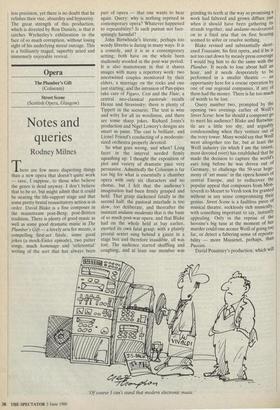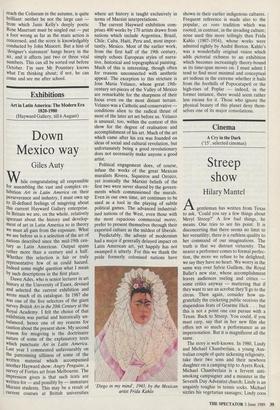Opera
Street Scene (Scottish Opera, Glasgow)
Notes and queries
Rodney Milnes
There are few more dispiriting things than a new opera that doesn't quite work — save, I suppose, to those who believe the genre is dead anyway. I don't believe that to be so, but might admit that it could be nearing the life-support stage and that some pretty brutal resuscitatory action is in order. David Blake is a fine composer in the mainstream post-Berg, post-Britten tradition. There is plenty of good music as well as some good dramatic music in The Plumber's Gift — a lovely aria for mezzo, a compelling first-act finale, some good jokes (a mock-Eisler episode), two patter songs, much hommage and 'referential' writing of the sort that has always been
part of opera — that one wants to hear again. Query: why is nothing reprised in contemporary opera? Whatever happened to repeatability? Is such purism not face- spitingly harmful?
John Birtwhistle's literate, perhaps too wordy libretto is daring in many ways. It is a comedy, and it is in a contemporary setting; both have on the whole been studiously avoided in the post-war period. It is also mainstream in that it shares images with many a repertory work: two intertwined couples monitored by their elders, a marriage on the rocks and one just starting, and the intrusion of Pan-pipes take care of Figaro, Cosi and the Flute; a central neo-classical pastorale recalls Henze and Stravinsky; there is plenty of Tippett in the scenario. The text is wise and witty for all its wordiness, and there are some sharp jokes. Richard Jones's production and Nigel Lowery's designs are smart as paint. The cast is brilliant, and Lionel Friend's conducting of a moderate- sized orchestra properly devoted.
So what goes wrong, and when? Long faces in the interval needed firmly squashing up: I thought the exposition of plot and variety of dramatic pace very persuasive. Admittedly the Coliseum is far too big for what is essentially a chamber opera with only six characters and no chorus, but I felt that the audience's imagination had been firmly grasped and held. That grasp slackened fatally in the second half: the pastoral interlude is too slow, too deliberate, and thereafter the insistent andante moderato that is the bane of so much post-war opera, and that Blake had on the whole held at bay earlier, exerted its own fatal grasp: with a plainly pivotal sextet sung behind a gauze in a stage box and therefore inaudible, all was lost. The audience started shuffling and coughing, and at least one member was grinding its teeth at the way so promising a work had faltered and grown diffuse just when it should have been gathering its strands together, and andante-moderatoed on to a final aria that on first hearing seemed to solve or resolve nothing.
Blake revised and substantially short- ened Toussaint, his first opera, and if he is not too cast down by measly press coverage I would beg him to do the same with the Plumber. It needs to lose about half an hour, and it needs desperately to be performed in a smaller theatre — an opportunity here for a rescue operation by one of our regional companies, if any of them had the money. There is far too much of worth to be lost.
Query number two, prompted by the opening two evenings earlier of Weill's Street Scene: how far should a composer go to meet his audience? Blake and Birtwhis- tle are a little too shy, and arguably condescending when they venture out of the ivory tower. Many would say that Weill went altogether too far, but at least the Weill industry (in which I am the tiniest, most devoted rivet) has established that he made the decision to capture the world's ears long before he was driven out of Germany, to challenge the 50-year hege- mony of 'art music' in the opera houses of central Europe, and to rediscover the popular appeal that composers from Mon- teverdi to Mozart to Verdi took for granted without in any sense compromising their genius. Street Scene is a faultless piece of musical theatre, recklessly rich musically, with something important to, say, instantly appealing. Only in the reprise of the heroine's big tune at the moment of her murder could one accuse Weill of going toQ far, or detect a faltering sense of repeata- bility — more Massenet, perhaps, than Puccini.
David Pountney's production; which Will 'Of course I can't stand that modern electronic music.' reach the Coliseum in the autumn, is quite brilliant: neither he nor the large cast from which Janis Kelly's deeply poetic Rose Maurrant must be singled out — put a foot wrong as far as the main action is concerned, and the score is knowledgably conducted by John Mauceri. But a hint of 'designer's statement' hangs heavy in the air, and it affects just two or three vital numbers. This can all be sorted out before October. I'm sure Mr Pountney knows what I'm thinking about; if not, he can come and see me after school.



















































 Previous page
Previous page